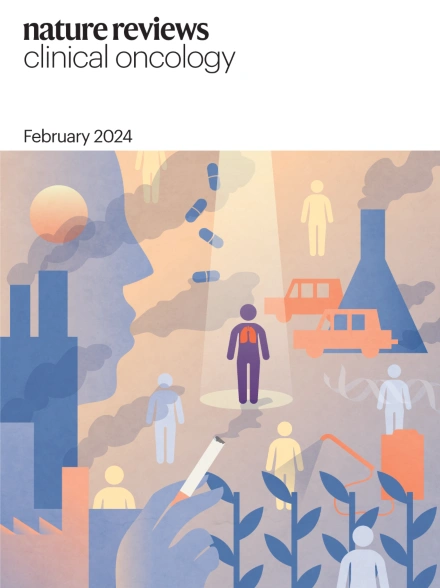肛门癌分子和治疗领域的新进展和未来机遇
IF 82.2
1区 医学
Q1 ONCOLOGY
引用次数: 0
摘要
肛门鳞状细胞癌(ASCC)是一种罕见的恶性肿瘤,发病率呈上升趋势。原发性放化疗(CRT)是局部ASCC患者的标准治疗方法。在转移性肿瘤中,免疫检查点抑制剂单药治疗的试验结果与接受化疗的患者相似。相反,在复发或转移性ASCC患者的化疗中加入抗pd -1抗体retifanlimab已被证明可显着改善预后。尽管在开发个性化治疗方面做出了巨大努力,但治疗指导和预后仍然依赖于基线临床特征。对ASCC分子特征的进一步了解提供了对介导肿瘤进展和对CRT反应的机制的见解。例如,已知人乳头瘤病毒(HPV)感染在大多数ascc中具有病原学作用,并且可以通过几种不同的机制调节细胞对CRT的反应。在这篇综述中,我们总结了ASCC分子和治疗领域的新进展,包括用于治疗指导的生物标志物的实施和转化为新的治疗方法,HPV感染构成了肿瘤生物学和临床结果的全局决定因素。我们还讨论了在HPV+肿瘤患者中联合免疫检查点抑制剂与CRT的基本原理。本文章由计算机程序翻译,如有差异,请以英文原文为准。


Emerging advances and future opportunities in the molecular and therapeutic landscape of anal cancer
Anal squamous cell carcinoma (ASCC) is a rare malignancy with an increasing incidence. Primary chemoradiotherapy (CRT) is the standard-of-care treatment for patients with localized ASCC. In the metastatic setting, trials testing immune-checkpoint inhibitor monotherapy have demonstrated outcomes similar to those of patients receiving chemotherapy. Conversely, adding the anti-PD-1 antibody retifanlimab to chemotherapy in patients with recurrent or metastatic ASCC has been shown to significantly improve outcomes. Despite considerable efforts to develop personalized therapy, treatment guidance and prognosis remain reliant on baseline clinical characteristics. An improved understanding of the molecular characteristics of ASCC has provided insights into the mechanisms that mediate tumour progression and response to CRT. For example, human papillomavirus (HPV) infection is known to have an aetiological role in most ASCCs and can modulate cellular responses to CRT via several distinct mechanisms. In this Review, we summarize emerging advances in the molecular and therapeutic landscape of ASCC, including the implementation of biomarkers for treatment guidance and translation into new therapeutic approaches, with HPV infection constituting a global determinant of both tumour biology and clinical outcome. We also discuss the rationale for combining immune-checkpoint inhibitors with CRT in patients with HPV+ tumours. Anal squamous cell carcinoma (ASCC) is a rare malignancy, albeit with an increasing prevalence in most economically developed countries. Despite considerable advances in our understanding of the biology of ASCC, chemoradiotherapy (CRT) remains the standard-of-care therapy for most patients, albeit with promising data emerging on the role of CRT plus immune-checkpoint inhibitors in the metastatic setting. In this Review, the authors describe the biology of ASCC and relate this to the various attempts to improve outcomes via the development of more effective systemic therapies and/or combinations.
求助全文
通过发布文献求助,成功后即可免费获取论文全文。
去求助
来源期刊
CiteScore
99.40
自引率
0.40%
发文量
114
审稿时长
6-12 weeks
期刊介绍:
Nature Reviews publishes clinical content authored by internationally renowned clinical academics and researchers, catering to readers in the medical sciences at postgraduate levels and beyond. Although targeted at practicing doctors, researchers, and academics within specific specialties, the aim is to ensure accessibility for readers across various medical disciplines. The journal features in-depth Reviews offering authoritative and current information, contextualizing topics within the history and development of a field. Perspectives, News & Views articles, and the Research Highlights section provide topical discussions, opinions, and filtered primary research from diverse medical journals.

 求助内容:
求助内容: 应助结果提醒方式:
应助结果提醒方式:


